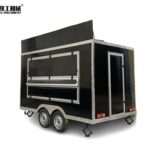Tiny food trailer is a mobile kitchen unit designed to be towed by a standard vehicle. They can be customized to suit different requirements, such as coffee, ice cream, barbecue, fried snacks, or others. Their compact design does not compromise on functionality, as most trailers come equipped with storage cabinets, sinks, refrigerators, cooking stations, and ventilation systems. The core appeal of a small food trailer lies in its elegant simplicity and focused design. The fundamental anatomy includes a sturdy trailer chassis, a weatherproof exterior body, and a meticulously planned interior. Are you looking for a food trailer for a new business? Get in touch with us to get more details.
Features of Tiny Mobile Food Trailers
- Compact Size
Tiny food trailers are designed to fit into small spaces, which makes them ideal for urban areas, busy markets, festivals, and neighborhoods where larger trucks cannot operate. - Customizable Interiors
From coffee-making equipment to pizza ovens, tiny trailers can be tailored to fit the specific needs of the business. - Lightweight Design
Due to their smaller size, these trailers can be towed by a wide variety of vehicles, reducing transportation costs. - Durable Construction
Built with stainless steel interiors, food-grade materials, and insulated walls, they can withstand heavy use while maintaining hygiene standards. - Efficient Layout
Despite limited space, tiny trailers are designed for maximum efficiency. Strategic placement of workstations allows smooth food preparation and customer service.
Applications Of Tiny Food Trailer
- Street Food Vendors: Selling snacks, drinks, and fast food in busy districts.
- Coffee Trailers: A mobile café serving espresso, cappuccino, and cold brews.
- Dessert and Ice Cream Trailers: Perfect for parks, beaches, and festivals.
- Barbecue and Grill Trailers: Offering grilled meat, seafood, or vegetarian specialties.
- Event Catering: Weddings, parties, and corporate events often hire food trailers for unique catering experiences.
- Farmers’ Markets: Small food trailers fit perfectly in local markets to sell organic snacks or freshly made meals.
Working Principle Of Mobile Food Trailers
A tiny food trailer operates like a miniaturized restaurant kitchen. The trailer is equipped with the following systems:
- Power Supply: Trailers can connect to external electricity, use generators, or integrate solar panels for sustainable energy.
- Water System: Includes freshwater and wastewater tanks, along with sinks for washing and cleaning.
- Ventilation System: Exhaust fans and hoods maintain air circulation and remove smoke or odors.
- Cooking Equipment: Depending on the business type, this may include fryers, grills, ovens, or coffee machines.
- Refrigeration Units: Essential for storing perishable ingredients safely.
Buying Guide: How To Choose The Right Tiny Food Trailer
- Define Your Business Needs
Decide what type of cuisine you plan to serve, as this determines the necessary equipment and trailer size. - Evaluate Size and Weight
Choose a trailer that fits your vehicle’s towing capacity and provides enough workspace for staff. - Look For Customization Options
Work with manufacturers who offer customization to match your business vision. - Inspect Build Quality
Prioritize stainless steel interiors, food-grade surfaces, and strong chassis for durability. - Compare Prices
Research different suppliers to balance affordability and quality.


